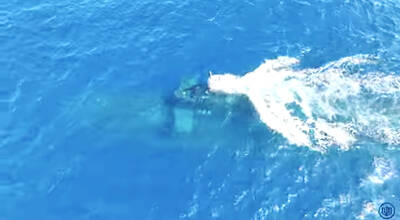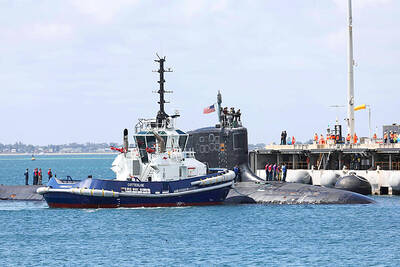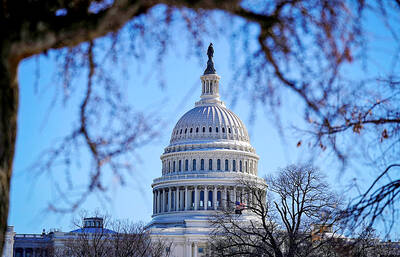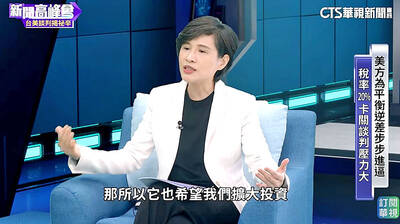President Ma Ying-jeou (馬英九) said yesterday he found it a consolation that the nation’s title at the Olympic Games and arrangements for the opening ceremony procession have been resolved, voicing hope that there would be no controversies before the Beijing Games begin.
“Disputes over the designation of Taiwan’s Olympic team ... and its order of appearance at the opening ceremony have been resolved,” Ma said while visiting the National Sports Training Center in Zuoying (左營), Kaohsiung City, to present a national flag to the nation’s Olympic delegation.
Ma was referring to the notice received on Tuesday that the the Games’ opening procession on Aug. 8 will be arranged based on stroke number in in the first character of each country or territory’s name in simplified Chinese.
Under this system, Taiwan will be the 24th team to enter the stadium after Japan and before the Central African Republic and Hong Kong.
In the past, the Greek delegation has led the procession, followed by the rest of the teams in alphabetical order in the language of the host country, except for the host team, which is traditionally the final team.
Based on a protocol signed in 1981 between the Chinese Taipei Olympic Committee and the International Olympic Committee (IOC), the “Chinese Taipei Olympic Committee” was abbreviated as “TPE” and therefore listed under the “T” section in the IOC’s directory and in the processions.
Ma said he was glad that both sides handled the matter in the spirit of “shelving differences and creating a win-win situation” and he hoped the Olympics would come off without a hitch because Beijing has been working hard to make it a success.
Meanwhile, Presidential Office Spokesman Wang Yu-chi (王郁琦) said the Beijing line-up would be acceptable if the arrangement was made in accordance with Olympic regulations and precedents, when he was asked if the Presidential Office considered the arrangement an attempt to denigrate Taiwan’s sovereignty.
Some have expressed concern that the arrangement might set an example for other countries, but Wang said cross-strait relations were improving and both sides extended goodwill to each other.
It was unnecessary for Taiwan to predict what would happen in the future, he said, adding that the Presidential Office believed both sides would find a suitable model that was mutually beneficial if both sides showed each other respect.
Executive Yuan Spokeswoman Vanessa Shih (史亞平) said the government had negotiated on an equal footing with China on Taiwan’s title at the Olympic Games and the placement of its athletes in the march.
The procession arrangements are in line with IOC regulations and the government does not see them as a bid to downgrade the country’s dignity, she said.
The government made it very clear during the negotiations that the arrangements were a “one time” deal and would not be applied to other competitions, she said.
The Democratic Progressive Party (DPP), however, accused China of trying to downgrade Taiwan’s status to that of an administrative region of China.
The “Chinese Taipei” team and Hong Kong’s “Hong Kong, China” team — Zhonghua Taibei (中華台北) and Zhongguo Xianggang (中國香港) — will be very close to each other.
Although Taiwan will not be grouped with China in the procession, the DPP was concerned a precedent would be set of Taiwan being grouped with China and Hong Kong in future Olympics and other international sports events.
DPP Legislator Kuan Bi-ling (管碧玲) said Taiwan should not accept the arrangement even though Beijing said it would position the Central African Republic between Taiwan and Hong Kong.
She said there was no guarantee that China would not change the order to place Taiwan’s team next to Hong Kong’s.
“China should stop playing with words using Chinese characters,” DPP Legislator Pan Men-an (潘孟安) said.
When asked if Taiwan had been downgraded, DPP Chairwoman Tsai Ing-wen (蔡英文), on leaving the party’s Central Standing Committee meeting, sighed and said “the Presidential Office has been setting a low standard.”
The DPP caucus also condemned KMT Chairman Wu Poh-hsiung’s (吳伯雄) decision to attend the Olympic opening ceremony.
“It is unbelievable” that while the Ministry of Foreign Affairs urged the heads of Taiwan’s allies not to attend the Beijing Olympics, the chairman of the country’s governing party is going, DPP Legislator Gao Jyh-peng (高志鵬) said.
Unless Wu is allowed to display the Republic of China’s (ROC) flag and promote Taiwan’s sovereignty at the ceremony, there would be no need for Wu to take part, Gao said
Under the 1981 protocol, the ROC flag and national anthem cannot be used at official venues of the competition.
Wu responded to the DPP’s complaints by urging the party to stop its “smear campaign.”
“What has the DPP done for our Olympic team in the past eight years? At least the KMT is fighting for more space for ‘Chinese Taipei’” Wu said before presiding over the party’s Central Standing Committee meeting.
Additional reporting by Mo Yan-chih

CSBC Corp, Taiwan (台灣國際造船) yesterday released the first video documenting the submerged sea trials of Taiwan’s indigenous defense submarine prototype, the Hai Kun (海鯤), or Narwhal, showing underwater navigation and the launch of countermeasures. The footage shows the vessel’s first dive, steering and control system tests, and the raising and lowering of the periscope and antenna masts. It offered a rare look at the progress in the submarine’s sea acceptance tests. The Hai Kun carried out its first shallow-water diving trial late last month and has since completed four submerged tests, CSBC said. The newly released video compiles images recorded from Jan. 29 to

DETERRENCE EFFORTS: Washington and partners hope demonstrations of force would convince Beijing that military action against Taiwan would carry high costs The US is considering using HMAS Stirling in Western Australia as a forward base to strengthen its naval posture in a potential conflict with China, particularly over Taiwan, the Wall Street Journal reported on Saturday. As part of its Indo-Pacific strategy, Washington plans to deploy up to four nuclear-powered submarines at Stirling starting in 2027, providing a base near potential hot spots such as Taiwan and the South China Sea. The move also aims to enhance military integration with Pacific allies under the Australia-UK-US trilateral security partnership, the report said. Currently, US submarines operate from Guam, but the island could

RESTRAINTS: Should China’s actions pose any threat to Taiwan’s security, economic or social systems, China would be excluded from major financial institutions, the bill says The US House of Representatives on Monday passed the PROTECT Taiwan Act, which states that Washington would exclude China from participating in major global financial organizations if its actions directly threaten Taiwan’s security. The bill, proposed by Republican Representative Frank Lucas, passed with 395 votes in favor and two against. It stipulates that if China’s actions pose any threat to Taiwan’s security, economic or social systems, the US would, “to the maximum extent practicable,” exclude Beijing from international financial institutions, including the G20, the Bank for International Settlements and the Financial Stability Board. The bill makes it clear that China must be prepared

Taiwanese trade negotiators told Washington that Taipei would not relocate 40 percent of its semiconductor production to the US, and that its most advanced technologies would remain in the nation, Vice Premier Cheng Li-chiun (鄭麗君) said on Sunday. “I told the US side very clearly — that’s impossible,” Cheng, who led the negotiation team, said in an interview that aired on Sunday night on Chinese Television System. Cheng was referring to remarks last month by US Secretary of Commerce Howard Lutnick, in which he said his goal was to bring 40 percent of Taiwan’s chip supply chain to the US Taiwan’s almost